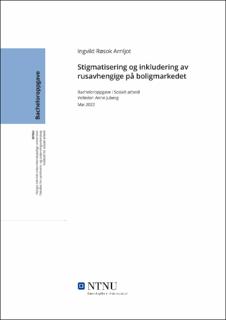| dc.contributor.advisor | Juberg, Anne | |
| dc.contributor.author | Arnljot, Ingvild Røsok | |
| dc.date.accessioned | 2022-06-24T17:20:24Z | |
| dc.date.available | 2022-06-24T17:20:24Z | |
| dc.date.issued | 2022 | |
| dc.identifier | no.ntnu:inspera:111265159:43304446 | |
| dc.identifier.uri | https://hdl.handle.net/11250/3000691 | |
| dc.description.abstract | Oppgaven er en litteraturstudie med problemstillingen «Hvordan påvirker stigmatisering rusavhengiges muligheter, og hvilke utfordringer innebærer stigmatiseringen for møtet med boligmarkedet?». Oppgaven forsøker å belyse rusavhengiges muligheter på boligmarkedet sett i lys av kapital og stigmateori, og trekker frem viktigheten av tilrettelagte botilbud for rehabilitering. Forskning viser at mange rusavhengige føler på stigmatisering fra samfunnet rundt seg. Dette påvirker mulighetene for bosetting, rehabilitering, og selvstendig mestring i hverdagen. Stigmatiseringen kan oppleves som en selvoppfyllende profeti, altså at personens forventninger til utfallet påvirker det faktiske utfallet. Dette kan gjøre at sosial mobilitet føles begrenset og mestring av egen situasjon føles krevende. Temaet sees i lys av Pierre Bourdieus begreper kapital og habitus og Erving Goffmans stigmateori for å forklare rusavhengiges sosiale status på boligmarkedet. Oppgaven belyser hvordan stigmatisering påvirker samhandlingen mellom personer med ruslidelser og hjelpesystemet, privatpersoner i samfunnet, og viktigheten av tilrettelegging og brukermedvirkning. Funnene tilsier at stigmatisering av rusavhengige hindrer både motivasjonen til å søke hjelp, og muligheten til å tilegne seg og ivareta egen bolig. Tilrettelagte tiltak er derfor nødvendige for å øke deres sosiale status og kapital for å bedre livssituasjonen. | |
| dc.description.abstract | Research suggests that stigma plays a role in the rehabilitation of recovering substance addicts, and the individual’s perceptions of their own abilities and self worth. I have attempted to create a general overview of how different types of stigma impact their position in the housing market, and the ability to obtain and maintain housing responsibilities through asking the question “How does stigma affect people with substance addiction, and which challenges do they face on the housing marked as a result of said stigma?”. The thesis is based on research of said group, and their perceived experience of stigma from the society around them, on a structural level, as well as an individual level. A result of this appears to be an internalisation of this stigma, directly affecting their perception of their own capabilities to change their life situation and resist the oppression they face. The topic is seen through the central theories of Pierre Bourdieu, capital and habitus, as well as Erving Goffman’s stigma theory. By using these theories, the thesis aims to shed light on how stigma plays a role in the interactions of people suffering from drug addiction with the surrounding society. Access to housing, resources and facilitation are also central topics. The findings suggest that the stigmatisation not only prohibits people with this illness from reaching out for help, but also the ability to obtain and maintain their own residence. | |
| dc.language | nob | |
| dc.publisher | NTNU | |
| dc.title | Stigmatisering og inkludering av rusavhengige på boligmarkedet | |
| dc.type | Bachelor thesis | |
